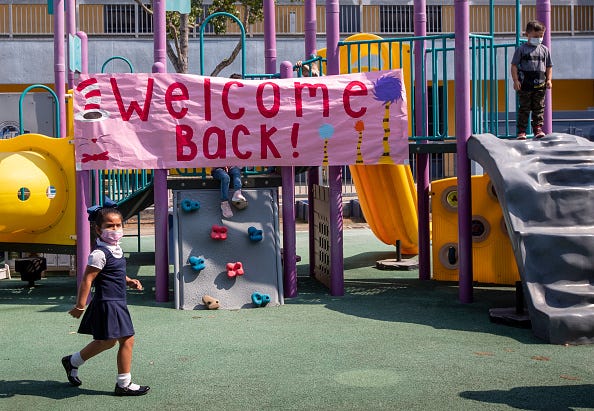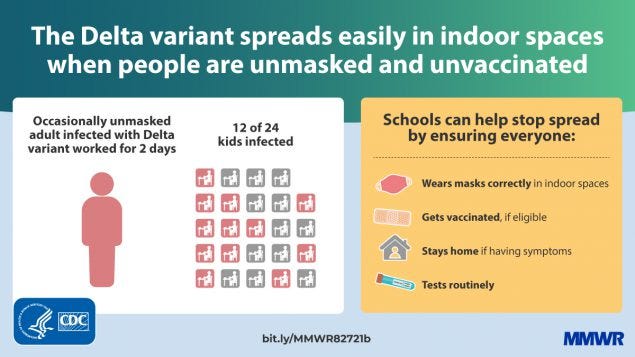Back to School in a pandemic.
The anxiety isn’t even about the kids — but the adults who’re putting their own biases ahead of our childrens’ wellbeing.
Yesterday, my three-year-old daughter, Emmalee, started pre school. Like in many households with young kids, our morning was aflutter with the usual season’s excitement: the promise of new friends, the anticipation of new learnings, and last minute adjustments to a new routine.
But this back-to-school season has been ... heavy.
On the one hand, there’s profound gratitude at its very existence considering how unlikely it was as we wade through the second year of a seemingly endless pandemic. And then there’s the anxiety: What if it’s another false start — another school year aborted even before the leaves begin to fall, new routines replaced by Zoom school? Worse, what if my kid gets sick?
As I pulled up to Emmalee’s preschool, I handed her the aquamarine mask with orange ear loops she’d chosen to match her dress that morning. “Don’t take this off today, Emmalee,” I told her as I craned my neck to look back at her as she adjusted it over her left ear. We locked eyes for a moment, emphasizing the gravity in my voice.
I was lucky to be dropping her off at a school with strict mask and vaccination mandates. The case rate in Michigan, though high, hasn’t touched the surges in states like Texas and Florida, where governors have made illegal the very mask and vaccine mandates that will keep my daughter and her classmates safe.
In those states, many of which started school just weeks ago, multiple outbreaks have already been reported. In Jacksonville, a middle-high school was forced to close in-person education and go back online after nearly 1,000 students tested positive for COVID-19 across the district by the third week of school. The Duval County School Board finally approved a mask mandate after an eight-hour, 68-speaker public meeting — “two weeks too late” according to a local children’s infectious disease specialist.
But it’s not just public officials who are putting themselves before the kids. One unvaccinated, unmasked teacher read aloud to a classroom of 24 kids who were too young to be vaccinated; 12 of them got sick in an outbreak that infected 26 people over all.
In an era when the shocking has become mundane, it remains astounding how little regard adults in power have for the children their choices (in)fect.
What would we expect of a teacher if they saw a small child about to cross into a busy intersection in front of their school? We’d expect them to do all they could to prevent that child from being struck by a car.
What would we expect of a school board if there was a rash of injuries to children in front of schools? We’d expect action — employ a crossing guard, enforce speed restrictions, put up a fence to protect children from walking into the street.
Zoom out further still and you’ll find the work of mayors and governors and congresspeople to prevent these very things from happening: school traffic zones where speed limits are reduced and penalties for excessive speeds are steeper, signage around schools that indicate these zones, crossing guards during busy hours. They’re all remnants of a moment in America when children’s lives and wellbeing were sacred — so quintessentially the goal of our politics that they were untouchable.
No longer. Which is why, as millions of families send their children back to school, we wait with bated breath for their healthy return. And hopefully, the opportunity to go back again tomorrow.





